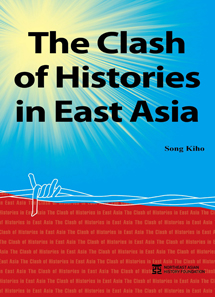Publication
- Date2011.06.20
- Hit1857

1. All rights of the contents and the electronic files in the Webpage are reserved for the Northeast Asia History Foundation.
2. No part of the Webpage may be reproduced, stored in retrieval system, or transmitted, in any form or by any means, without the prior permission.
Title : The Clash of Histories in East Asia
Written by Song Ki-ho
B5, 460 pages
December 2010
US $20
ISBN 978-89-6187-177-8
The central subject of this book is the Northeast Project, with which it deals mostly in the second half. The last chapter, on the identity of Korean history, may be understood as my own answer to the questions that are raised in this book. This book also discuses other history-related disagreements among Korea, China, and Japan that I found pertinent to its central topic: What constitutes the identity of Korean history? History textbooks, nationalism, and territorial disputes are some of the other contentious issues. As the readers of this book will agree, a symptomatic characteristic of all disputes occurring between countries, whether they concern history or territory, is that they are based on mutually contradictory assertions. One example of this type of self-contradictory argument is a country claiming that an area belonged to it in the past, and at eh same time claiming another area as having been acquired by it in recent times. In such a context, discussions and debates are hardly means for reaching resolutions. International disputes have little regard for academic truth, but are all about power. It would be naive for a historian to have an inflated perception of his scholarly contributions to controversies that are by nature political. To help with the reader's understanding, this book added a section on "Further Reading" at the end of some chapters, and included many photos and illustrations.
Table of Contents
Chapter 1. Nationalism and History Education
1. Japanese Right-wing Extremism and History Textbooks
2. The Resurgence of China and Patriotic History Education
3. Nationalist Histories of South Korea and North Korea
Further Reading 1: Egregious Statements by Japanese Political Leadership
Further Reading 2: “Freedom of Thought” and Japanese Democracy - Toward a Constructive Dialogue between Intellectuals and Concerned Citizens of South Korea and Japan
Chapter 2. Territorial Disputes and History
1. Territorial Disputes in East Asia
2. The Mount Baekdu Border Marker and Gando
3. The Territorial Status of Dokdo and the Naming of the East Sea/Sea of Japan
4. The Russian Maritime Province and Korean History
Further Reading : Takeshima and Dokdo
Chapter 3. Controversies over Korean History
1. Colonial History and Postcolonial Revisionism - Japan and the Two Koreas
2. Colonial Exploitation vs. Colonial Modernization - Korean History and the Economic History of Korea
3. Particularity and Universality in Korean History - The United States and Korea 4. Gaya and Imna - Korea and Japan
Chapter 4. China’s Northeast Project and the System of Korean History
1. The Northeast Project and Its Historical Perspective
2. The Background of the Northeast Project
3. Manchuria and Korean History
Chapter 5. The Chinese Territorial View and Concept of Ethnic Identity
1. The World View in Ancient China and the Concept of Huayi
2. The Modern Chinese World View
3. Views from Outside China
Chapter 6. Chinese Perceptions 1: Korean People, Gojoseon, Buyeo, Balhae
1. Manchurian Tribes and the Formation of Korean Ethnicity
2. Gojoseon and the Four Han Commanderies, Buyeo, and Northern Okjeo
3. Balhae
Further Reading : Is Balhae An Ancient Chinese Polity?
Chapter 7. Chinese Perceptions 2: Goguryeo
1. The Chinese Perception of Goguryeo
2. Principal Chinese Arguments
Further Reading : A few Issues in Historical Research on Goguryeo
Chapter 8. In Search of Solutions to Controversies
1. South Korean Reactions to the Northeast Project
2. Post-Nationalist Views
3. Goguryeo, the No-Man’s Land of History
4. Views of the Shared History School
5. Other Views
Chapter 9. The Identity of Korean History
1. Historical Self-Perception
2. The Perception of Borders and Territory
3. Korea’s Own World View
4. The Future of Historical Research
Further Reading : Goguryeo Controversy Seen by Foreign Scholars
